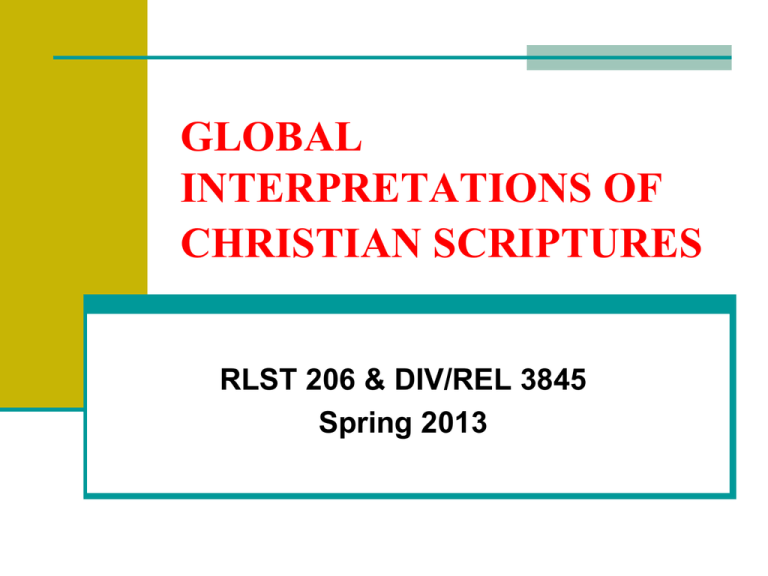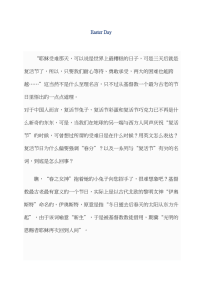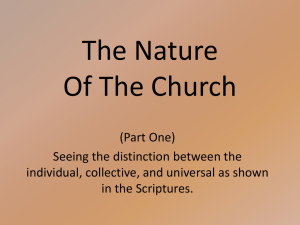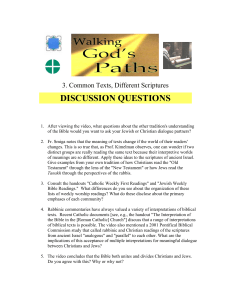GLOBAL INTERPRETATIONS OF CHRISTIAN SCRIPTURES RLST 206 & DIV/REL 3845
advertisement

GLOBAL INTERPRETATIONS OF CHRISTIAN SCRIPTURES RLST 206 & DIV/REL 3845 Spring 2013 Welcome! Today…….. 3:10 Introduction: Presentation of the Semester (and of the Syllabus) Why study Global Interpretations of Christian Scriptures? Why we need to “Read with” Others? For ethical reasons. For theological reasons. For critical reasons. 4:25-5:25 Group exercise: reading Luke 17:11-19 where we will get to know each other a little 5:25-5:40 Preparing for next week Welcome! Syllabus…….. Pedagogical Goals of this Seminar: (see Appendix # 1 to this syllabus; page 10) REQUIREMENTS: Active participation Four Seminar presentations Quizzes: 4 quizzes on readings Paper Proposal and A PAPER = a Contextual Commentary on a Biblical Book (2nd ½ of semester) Practical Steps of this Seminar: (see Appendix # 2 to this syllabus; page 11) Why study Global Interpretations of Christian Scriptures? Because there are many interpretations of the same Scripture out there, and the VERY COMMON ATTITUDE IS Of course, our/my own interpretation –and that of our/my church, whatever it might be—is right And all the other interpretations are wrong, heretical, meaningless, not faithful to the text; All other readers of the Bible as Scripture are wrong if they disagree with us… because they are ignorant, naïve, stupid, from an inferior culture (a non-Western culture)… and simply need to be educated. Why study Global Interpretations of Christian Scriptures? Appendix # 1 A & B (See end of the syllabus) Three Parts A. To learn about distinctive interpretations of the Bible as Christian Scriptures around the world. B. To Learn What is involved in any “interpretation of Scriptures.” How it is related to: a) the believers’ vision of life, structured by religious experience and culture; b) their concerns and commitments in the concrete social, economic, political reality of their life-context, and thus to their “ideology”; c) their view of what is most significant in the biblical text. Why study Global Interpretations of Christian Scriptures? Appendix # 1 C C- To recognize that Christian believers and scholars are always making a choice among several possibilities of relating the teaching of the Bible: to their cultures (from “total separation” to “inculturation”) to their religious experiences (from ardent spiritual experiences to total lack of such experience in a secular life; sacramental/liturgical); to their life contexts (from concerns for the needs of people every where to concerns exclusively limited to people close to us— inter(con)textual and liberation interpretation). by choosing as most significant one or another aspect of each biblical text. Analytical choice Why study Global Interpretations of Christian Scriptures? A) To learn about distinctive interpretations of the Bible as Christian Scriptures around the world. Why? a) Because most of the readers of the Bible are Christian believers who read these texts as SCRIPTURE —a fact that one cannot afford to bracket-out be it in religious studies, critical studies of the Bible, or in theology; b) Because 2/3 of Christian readers of the Bible are in Africa, Asia, Latin America, and Oceania, as well as in Eastern Europe and the Middle East Only 1/3 of the readers of the Bible are in Western Europe and North America Learning about distinctive interpretations of the Bible around the world is possible Because there is NO literal meaning of the Bible (aka no fundamental interpretation of the Bible) There is NO literal reading. The phrase “literal reading” designates a specific type of interpretation = a “literal Interpretation” Rather than speaking of “the literal interpretation” of a text as if there was only one, throughout this semester you have to become specific and explain the nature or character of each specific “literal interpretation”… Learning about distinctive interpretations of the Bible around the world is necessary There is nothing wrong with adopting “what the text obviously means” for us PROVIDED that we recognize that we have implicitly chosen an interpretation FOR THIS, we need other interpretations, from Other cultural contexts, Other socio-economic contexts Other religious contexts THESE “OTHER” INTERPRETATIONS (if we respect them) HELP US To recognize that “what the text obviously means” (aka = its literal meaning) for us is an interpretation. Is choosing certain aspects of the text as most significant And ignoring other aspects of the text… which are “obviously” the most significant for people in other contexts. Why study Global Interpretations of Christian Scriptures? B) B. To gain a solid understanding of: 1) What is involved in any “interpretation of Scriptures.” How it is related to: a) their view of what is most significant in the biblical text. [Analytical Choices = A] b) the believers’ vision of life, structured by religious experience and culture; [Hermeneutical, Theological Choices = H] b) their concerns and commitments in the concrete social, economic, political reality of their life-context, and thus to their “ideology” [Contextual Choices = C] Why study Global Interpretations of Christian Scriptures? B) To gain a solid understanding of: 2) What is involved in “interpretations of Christian Scriptures,” i.e., both New Testament and Christian interpretations of the Jewish Scriptures (Tanakh or Hebrew Bible). What distinguish these Christian interpretations? WORD-TO-LIVE-BY for Christians with [[Hermeneutical/Theological Choices]] A certain Christian vision of life? Christian religious experience? A particular way in which this vision of life is related to the believers’ given cultures? [[Contextual Choices]] A certain conception of the believers’ relationship to their life-context? to power and authority? A sense of responsibility for those in need, in their family, their Christian community, their society, and/or in the international context? [[Analytical Choices]] A certain view of what is most significant in the biblical texts? Its “narrative” (e.g., because believers view it as their story)? Its moral teaching (e.g., because it aims to transform its readers’ behavior)? Its symbolism (e.g., because it contributes to establish the believers’ view of life)? Its rhetorical dimension (e.g., because it aims to transform its readers’ vision of life and behavior)? Why study Global Interpretations of Christian Scriptures? B) To gain a solid understanding of: 3) The diversified nature of “Global interpretations of Christian Scriptures.” Because interpretations performed in different parts of the world are “foreign” to us, they help us recognize, in our own and in (Western) scholarly interpretations the role of: a) the believers’ vision of life; [[H choices]] b) the believers’ concerns and commitments in the concrete reality of their life-context; [[C choices]] c) their view of what is most significant in the biblical text. [[A choices]] Why study Global Interpretations? C) To recognize that Christian believers and scholars are always making a choice among several possibilities of relating the teaching of the Bible: to their cultures (from “total separation” to “inculturation”) and their religious experiences (from ardent spiritual experiences to total lack of such experience in a secular life); [[H choices]] to their life contexts (from concerns for the needs of people every where to concerns exclusively limited to people close to us). [[C choices]] and this, by choosing as most significant one or another aspect of each Biblical text. [[A choices]] always very much concerned to assess the relative value of the teachings of the Bible resulting from each interpretation, as they try to discern (with religious discernment) those which are beneficial and those which are destructive in their context. Assessing the relative value of the teachings of the Bible resulting from each interpretation As 2 Peter 3:15-17 warns regarding the interpretation of Paul: “ So also our beloved brother Paul wrote to you according to the wisdom given him, 16 speaking of this as he does in all his letters. There are some things in them hard to understand, which the ignorant and unstable twist to their own destruction, as they do the other scriptures. 17 You therefore, beloved, since you are forewarned, beware that you are not carried away with the error of the lawless and lose your own stability.” NRSV Quiz! (Numbers from World Christian Encyclopedia, David Barrett, ed. (Oxford 2001, updated on line) Knowing that the world population is now about 7 billion people What are the four top religions in the world today (2009)? Alphabetical order: Buddhism, Christianity, Hinduism, Islam. Buddhist = about 400 million Hindus = about 900 million Islam = about 1.5 billion (with “b”) Christianity = about 2.3 billion; no tiny minority! … we ignore Christians in other parts of the world! As Word-to-Live-by Our reading of Scripture is incarnated, and thus inculturated. There is a great diversity of interpretations of the same Biblical texts as living Scripture by Christians from many traditions and many cultures, including from the Southern Hemisphere where the majority of Christians are. With the Cambridge Dictionary of Christianity, learn about 2.367 billion readers of the Bible CDC Articles on Denominations and their worship 2.367 billion Christians/readers of the Bible Roman Catholics 1.150 billion Protestant s 471 M Independent s 357 M Orthodox 275 M Angli cans 86 M Other 28 M CDC: Christian Renewalists (In Independent Churches & Movements in Denominations) Following Denominational Views 1.779 billion Christian Renewalists 588 M (growing fast) “Christ died for our sins/for us” What is the Word-to-live-by? 1 Corinthians 15:3 For I handed on to you as of first importance what I in turn had received: that Christ died for our sins in accordance with the scriptures Romans 5:8 God proves his love for us in that while we still were sinners Christ died for us. Romans 3:24-25 [sinners] are now justified by his grace as a gift, through the redemption that is in Christ Jesus, 25 whom God put forward as a sacrifice of atonement by his blood, effective through faith. Mark 14:24 my blood of the covenant, which is poured out for many (Luke 22:20 the new covenant in my blood) Matthew 26:28 this is my blood of the covenant, which is poured out for many for the forgiveness of sins. CDC: “Christ died for our sins/for us” What is the Word-to-live-by? Different: Why does Christ need to die for us? What is wrong with us? For Many Western Roman Catholics and Protestants, what is wrong is that God is angry with us, because our sins dishonored and angered God… we must be punished… For Most Orthodox, what is wrong is that we are sick or in bondage: sin is a disease which infects us, or an evil power which keeps us in bondage… we need to be freed from bondage… For Renewalists, what is wrong is that we revolt against God, we are angry with God … we need to be transformed, converted (turned around), “renewed," and empowered to trust God (faith) and to love God… CDC: “Christ died for our sins/for us” What is the Word-to-live-by? For Many Western Roman Catholics and Protestants, we must be punished… Christ is punished instead of us = Substitution atonement (especially since Middle Ages, Anselm; Reformation) Benefit from it “through rituals” (Catholic) “through faith” (Protestant) For Most Orthodox, we need to be freed from bondage… Christ died is a “redemption” = Christ paid the ransom to free us from bondage, making us the people God in a “new covenant”; as the Israelites were freed from bondage in Egypt and made the people of God in a “covenant” (Earliest) For Renewalists, we must be transformed, converted (turned around), and empowered to trust God (faith) and to love God… Christ’s blood and His Spirit empower us so that we might have faith (trust God), be born again, give our lives to God, and serve God through our entire life (especially since Abelard; Middle Ages and Modern) “Grace” What is the Word-to-live-by? Charis, either “Grace,” or the “Gift” of God in Christ has then different meanings. For Many Western Roman Catholics and Protestants, Christ is punished instead of us = Substitution atonement Grace = forgiveness by God Benefit from it “through rituals” (Catholic) “through faith” (Protestant) For Most Orthodox, Christ died is a “redemption” = Christ paid the ransom to free us from bondage, Grace = the gift of God = redemption, healing For Renewalists Christ’s blood and His Spirit empower us so that we might have faith (trust God), be born again, give our lives to God, and serve God through our entire life Grace = the gift of God = the gift of empowerment; the gift of the Spirit CDC “Christ died for our sins” Denominational views modified, adjusted, transformed by Cultures It is NOT the same thing to speak of God’s anger in different cultures: “God” = common name (NOT a proper name), thus translated in each language – keeping much of the meaning that “god” has in the religions in this cultural setting It is NOT the same thing to speak of bondage in different cultures, religious contexts, social contexts Bondage to evil spirits in “spiritual warfare” vs. bondage to bad culture vs. Economic, social bondage to poverty It is NOT the same thing to speak of revolt against God, or of the need to be transformed/converted in different cultural, religious, and social contexts The empowerment to be children of God might be an empowerment to reject one’s culture or to discover Christ already at work in one’s cultural setting, transforming it or to discover Christ already embodied in one’s culture Syllabus…….. The Global Bible Interpretation Form = comparing our interpretations with the interpretations of people around the world Group exercise: reading Luke 17:11-19 For next week, the beatitudes Matthew 5:3-12 History of World Christianity: Survey (2010) c2.273 billion Christians 1/3 world Peters Projection=Area Accurate… Africa, South America , Asia are much population larger! Articles on History of Christianity in Africa Asia Europe Latin America Middle East: Syria North America South Pacific & Australia 312 M 511 M >5 M 260 M 25 M 389 M North Africa 531 M Balkans Eastern Europe Western Europe Article on History of Christianity in Latin America (c511 M, growing) History of C. in Europe (with Eastern Europe & Russia) 2000: c531 M (going down) History of C. in Africa (2000) c389 M 1/2 Charismatics/Renewalists and AICs. (growing fast) History of Christianity in Asia (c312 M, growing fast) History of C. in North America (c260 M, stable; move to Independents) History of C. in South Pacific & Australia (c25 M, stable) History of C. in the Middle East: Syriac Christianity > 5 M (going down) Articles on History of C. in 134 nations 7 Nations with the largest Christian Populations USA 235.7 M China 89 M Mexico 95.2 M Brazil 155.5 M Russia 84.3 M Philip pines 68.1 M India 62.3M History of C. in 134 nations (<0.5 million C.). The next 10 Nations Nigeria 51.1 M Germany 62 M Italy 47 M Ukrain e 42M Franc e 41.8M R.D. Congo 49.5 M Colom bia 40M United Kingdo m 48.5 M Polan d 38M Spai n 37M Rest of the Nations with >10 Million Christians Ethiopia 36 M Argentin a 34 M South Africa 33.6 M Indonesia Peru 27.8 M 25 M Rest of the Nations with >10 Million Christians Ethiopia 36 M Argentin a 34 M South Africa 33.6 M Indonesia Peru 27.8 M 25 M Canada 24.7 M Kenya 23.9 M Venezuela 22.9 M Romania 19.8M South Korea 19 M Rest of the Nations with >10 Million Christians Ethiopia 36 M Argentin South a Africa 34 M 33.6 M Indonesia Peru 27.8 M 25 M Canada 24.7 M Kenya 23.9 M Venezuela 22.9 M Romania 19.8M South Korea 19 M Uganda 19 M Tanzania 16.9 M Australia 15 M Chile 13.6 M Netherlands 12.7 M Rest of the Nations with >10 Million Christians Ethiopia 36 M Argentina South 34 M Africa 33.6 M Indonesia Peru 27.8 M 25 M Canada 24.7 M Kenya 23.9 M Venezuela 22.9 M Romania 19.8M South Korea 19 M Uganda 19 M Tanzania 16.9 M Australia 15 M Chile 13.6 M Netherland s 12.7 M Ecuador 12.3 M Angola 12 M Ghana 11.2 M Guatemala 11.1M Egypt 10.3 M Christianity & Other Religious Traditions (from both points of view) African* Religion Cluster Ancestor* Veneration Cluster Australian* Aboriginal Baha’i* Cluster Buddhism* Cluster Civil* Religion Confucianism* Cluster Daoism* Cluster Freemasonry* Hellenistic* Religious Traditions Hinduism* Cluster Islam* Cluster Judaism* Cluster Mithraism* Mystery* Religions Native* American Traditions New* Age Spirituality Shamanism* Shinto* Sikhism* Cluster Vodou* CDC “Christ died for our sins” Denominational views modified, adjusted, transformed by Cultures It is NOT the same thing to speak of God’s anger in different cultures: “God” = common name (NOT a proper name), thus translated in each language – keeping much of the meaning that “god” has in the religions in this cultural setting It is NOT the same thing to speak of bondage in different cultures, religious contexts, social contexts Bondage to evil spirits in “spiritual warfare” vs. bondage to bad culture vs. Economic, social bondage to poverty It is NOT the same thing to speak of revolt against God, or of the need to be transformed/converted in different cultural, religious, and social contexts The empowerment to be children of God might be an empowerment to reject one’s culture or to discover Christ already at work in one’s cultural setting, transforming it or to discover Christ already embodied in one’s culture Being faithful = Acknowledging Brothers and Sisters in Christ = Respecting Brothers and Sisters’ Readings Not ignoring them = learning about them and from them Conversation = Dialogue … about a Scriptural text Reading the Bible WITH them is Neither reading TO them; nor reading FOR them: demeaning; viewing them as stupid, ignorant, “children” “viewing them as subalterns” We need their DIFFERENT readings to recognize we have made choices. Being faithful = Acknowledging Others = Respecting Other People’s Readings Reading the Bible WITH them = engaging the conversation in a most concrete and pragmatic way: = CONTEXTUALLY Asking them to explain and striving to understand why they view their chosen interpretations as better In their concrete social and cultural context? Because of their religious experience and views? And explaining ourselves why we view our chosen interpretations as better – if we still believe it is better, now that we recognize we have a choice Not Starting with “scholarly” readings (= seeking to explain and thus justify a textual choice) soon turn into reading TO OTHERS … “I know what the text mean, I do not have anything to learn from you” = you are NOT my brothers and sisters! “Christ died for our sins/for us” What is the Word-to-live-by? Christ is punished instead of us = Substitution atonement (especially in Western Countries; issue = MY salvation) fear of God’s punishment/anger; One Benefits from it “through rituals” (Catholic) OR “through faith” (Protestant) Christ died is a “redemption” = Christ paid the ransom to free us from bondage (especially in cultures with beliefs in evil spirits; BUT also Orthodox views – we are sick, need to be cured – AND liberation theologies - systemic evil ) Christ’s blood and His Spirit empower us so that we might have faith (trust God), be born again, give our lives to God, and serve God through our entire life (especially in societies where people feel powerless; lack of control over their lives… [and who does not!?] Need to know that God is in control )





